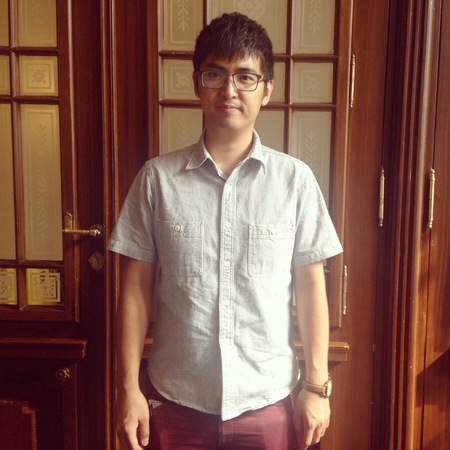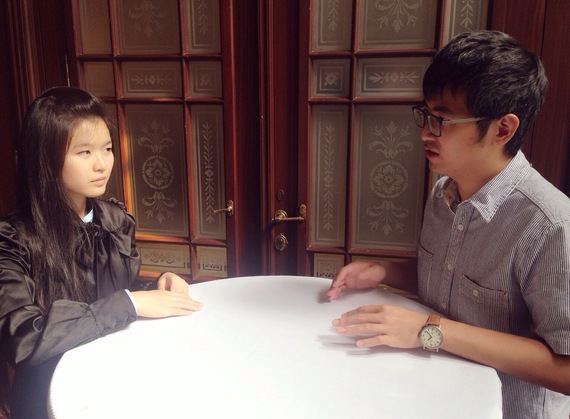Alex Chow is the former Secretary-General of the Hong Kong Federation of Students. He played an essential role in the Umbrella Movement. The act escalated into clashes with the police as tens of thousands of people gathered in support of the students. The protests spread and prompted sit-ins that shut down three main areas of Hong Kong for almost three months. Protesters claim that Beijing reneged on an agreement to grant them open elections by 2017, and demand the right to freely elect their own leader - ''true universal suffrage''.
- As told to Lan Anh Vu
How I got involved in the Umbrella Movement and what I did I joined the student organization called Hong Kong Federation, and I acted as Secretary-General of the Federation during the protest. In Hong Kong, the student movement has had a tradition of playing an important role in the democratic movement since the 70s and 80s. Liberal democracy is one of the goals that the society and the students would like to pursue.
Why did I join the organization? When I was in year one, I witnessed that the Red Power coming from Beijing might have even had its hands on the student union, so they wanted to exert control over the student union. It was at that time that a group of people, myself included, decided to run for an election to the student union. I won an election; my post was Vice President External. The Federation met on a weekly basis to discuss social issues in Hong Kong. We tried to engage in different movements and initiate different social actions. In the second year, I became the Secretary-General and spokesperson of the Federation. I also had to attend meetings and negotiate with different political parties and members of Occupy Central.
The reasons why young Hong Kongers are fighting for this causeThe historical choice factor and the difficult reality are the primary reasons for the fight. Liberal democracy seems to be an ideology that Hong Kong addicted to pursuing. Democracy seems to be a good idea, but it was kind of confining in terms of liberal democratic ideals like representative democracy in elections. Elections become the key to a current situation turning from bad to good. So this is one of the things that people would like to implement in Hong Kong.Hong Kong is such a modernized city, but people living in Hong Kong are facing a difficult situation. Rising housing prices and a growing wealth gap have indeed exacerbated discontent among many Hong Kongers. This accumulates lots of anger and anxious feelings towards the government and life. So, when people ask for a reform, for a change, liberal democracy has been a traditional goal that the people of Hong Kong wish to pursue, and that's how people subsequently join the movement.Apart from the two points mentioned, the fear of being Mainlanders is another factor. There is a fear that if we maintain the current status, without any reform, then Hong Kong shall turn into a normal city in China. Therefore, this stimulates people to act against the authoritative regimes.
How we could improveWhat we have to correct or we have to focus on is the political culture in Hong Kong. We have to rethink and reshape it. It's not simply about the organization acting as representative. We also need people to engage, that is not only about the reform of elections, but it is about the reform of the community, so that you can make changes through the politics of everyday life.We also need to keep motivation in the social movement, so that we can strengthen the network of people - people can connect with one another. When the movement comes, people simply do not work on their own, but instead people work with one another. Such tactics will help overcome the limitations of civil society or the organizations themselves.
If Beijing does not compromise on universal suffrageHong Kong and China will face an increasingly difficult situation. There are a lot of economic bubbles emerging right now in China. The trend, the so-called economic triggers, are not healthy at all. No matter whether in the short or long term, it will be reflected in consequences. The price will be paid by the government, authorities and also the people living there. If Beijing does not reform in the proposed way, then they cannot even save the economic aspect, and this will trigger more anger, dissatisfaction and more conflicts in Hong Kong. It will not be good in any sense. I would say this is not a healthy way to reform.
What I believe makes a strong leaderI would say, that we have a lot of misconceptions of what it means to be a strong leader. A strong leader can make a decisive decision that leads to a successful outcome, but that approach would be totally wrong to me.
To me, being a leader is not about simply leading or asking people to do whatever one wants; rather, it is about communicating with people to build trust, and to sustain support in the community or organization.
If we pursue a society with democracy, then it is not about whether we need a strong leader, but it is about the participation of the people. Therefore, a leader should be able to overcome the misunderstandings of different people, and carve out a solution. I would not propose that we simply need a certain number of leaders in Hong Kong, but rather we need a stronger society.
This interview has been condensed and edited for clarity.


